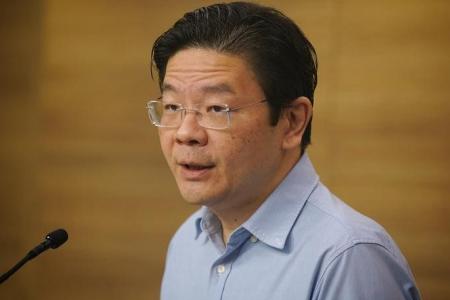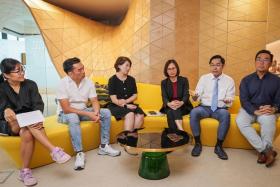6 in 10 Singaporeans trust that Lawrence Wong is best 4G leader to lead country in post-Covid-19 world: IPS survey
About six in 10 Singaporeans trust that Deputy Prime Minister Lawrence Wong is the best possible fourth-generation leader to see the country through a post-Covid-19 world, a study has found.
In particular, 60 per cent say they trust that the Singapore government has the best possible 4G leader to navigate divisions within the society; 59 per cent trust he is the best person to navigate Singapore's dealing with other countries; and 57 per cent believe he is the best person to navigate Singapore's post-Covid-19 recovery.
Mr Wong also had more support from better educated Singaporeans, said the survey.
Conducted by the Institute of Policy Studies (IPS) and released on Thursday (July 14), it is also the first large-scale public poll on Mr Wong's leadership.
The think tank had polled 1,000 people across seven weeks from April to May on their trust in leadership and society here.
This was part of a larger study on lessons learnt from the pandemic and where the country is headed that drew on over 2,000 respondents representative of Singapore's gender and race. About 500 people were polled about once every fortnight from April 2020 to June 2022, with 51 polls used in the study.
In a segment on "trust in 4G leader", the researchers noted that the pandemic came at a time when succession plans for Singapore's 4G leader was on the minds of many Singaporeans.
In April 2022, Prime Minister Lee Hsien Loong announced that Mr Wong - then Finance Minister and since promoted to also be Deputy Prime Minister - would lead the People's Action Party's (PAP) 4G team.
Mr Wong, the researchers noted, has been a prominent 4G figure for some time as the co-chair of the multi-ministry taskforce on the pandemic.
"We thus asked respondents, after this announcement was made, whether they trusted that the Singapore government has the best possible 4G leader," the researchers said.
Respondents who were higher educated were more likely to trust that DPM Wong was the best possible 4G leader, said study authors Dr Mathew Mathews, Dr Mike Hou and Ms Fiona Phoa of the IPS Social Lab.
Less than half of the respondents with a post-secondary education qualification or lower had high trust that Singapore had the best 4G leader, compared to the nearly 60 per cent among those with a degree or higher.
"Higher educated respondents took the lead in terms of expressing their support and confidence in the 4G leader, the 4G leadership. This was interesting to note because this particular demographic tends to be a bit more sceptical of government policies based on what we have seen so far," said Dr Hou at a briefing on the study on Thursday.
"We think that it is in particular because DPM Wong has been quite effective in addressing some of the considerations and concerns of this demographic."
Dr Hou added that this included concerns on issues to do with social cohesion that have emerged during the pandemic, such as on race and religion.
The survey also found that those who were more satisfied with how the government handled the pandemic had more trust in DPM Wong's leadership as well.
Around 83 per cent of those who had high satisfaction in how the government handled the pandemic had greater trust that it has the best possible 4G leader.
This compared to 14 per cent of those who had low satisfaction, and the 54 per cent of those who had moderate satisfaction.
Rising costs of living as well as the impending Goods and Services Tax (GST) hike, which will rise from 7 per cent to 9 per cent in the next two years, also influenced the levels of trust in DPM Wong.
About two in three of the respondents with low levels of worry about the GST increase had higher trust that the government has the best possible 4G leader, compared to less than half of those with higher levels of worry.
Researchers said that as the study was done online, this meant that certain segments of the population - older persons and those from lower income households - were less represented.
"This limits the generalisability of the results. To correct such a limitation, age was weighted in each wave according to national proportions," they said.
From March to July, the survey also asked 2,000 respondents if they had trust in Singapore's recovery and government, in the light of the impact of Covid-19.
About seven in 10 trusted that Singapore would remain economically competitive, and that Singapore would emerge from the crisis stronger and more resilient.
Almost two-thirds trusted that the Government knows how to navigate the global economy so that Singapore can bounce back from the hits it took during Covid-19, and that it is well-prepared to face the next pandemic.
Researchers found that respondents with better mental health and who perceived the job market outlook to be more positive were more likely to be confident that Singapore was ready to tackle future health crises.
About 75 per cent of those who had better mental health felt confident that the country was well-prepared for the next pandemic, compared to only 52 per cent of those who had lower psychological well-being.
And 82 per cent of those who saw the job market outlook to be positive felt confident that Singapore was equipped for such future health challenges - higher than the 46 per cent of those who felt more negatively about employment.
Get The New Paper on your phone with the free TNP app. Download from the Apple App Store or Google Play Store now


